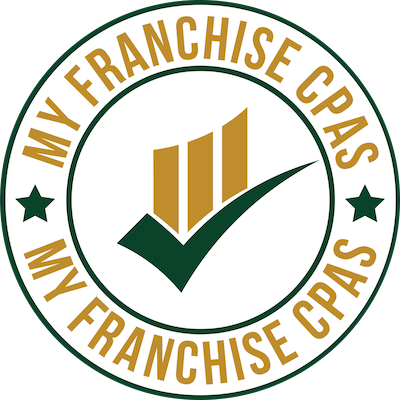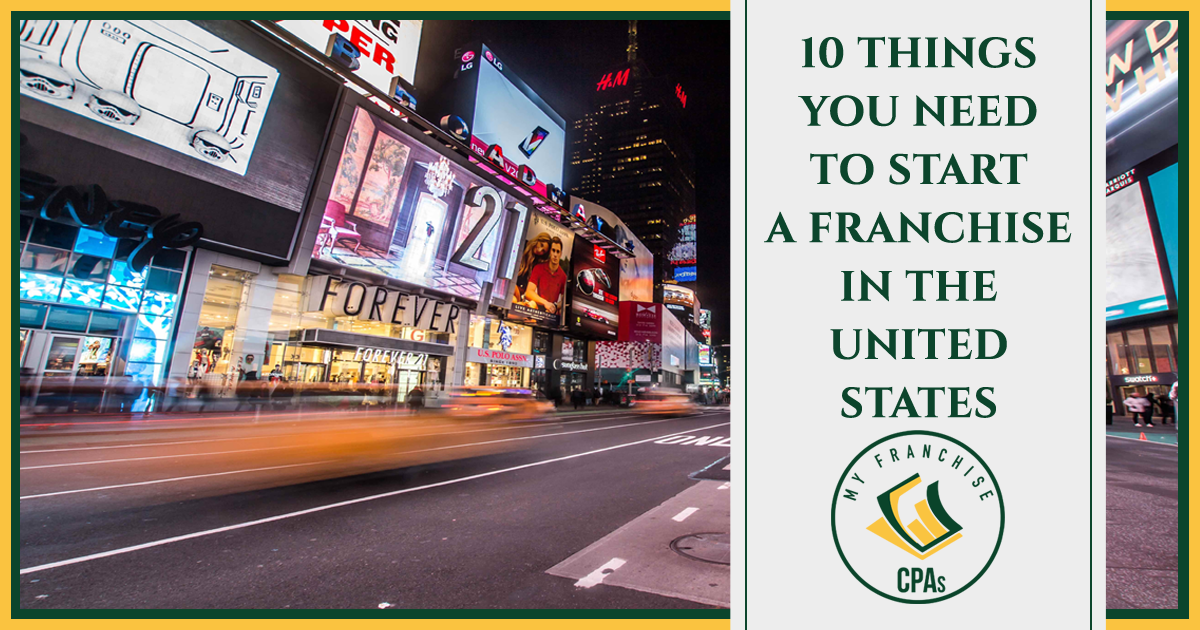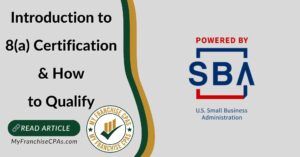10 Things you NEED to Start a Franchise in the United States
We receive several common questions about franchise formations.
What is the exact process to start a franchise?
How do I start a franchise in my state?
How do I start a franchise in the U.S.?
The list goes on and on.
You can start a franchise quite easily, as long as follow these ten key steps!
Requirements to Start a Franchise
1 – Form a legal business in your state
It all begins with your legal business formation in your chosen state. You cannot start a franchise without having a legal business.
There are several reasons why this is:
- The franchisor is only allowed to sign over the franchise to an existing business. Therefore, no business, no franchise.
- For your legal protection, you want to have a limited liability entity (there are several to choose from). With this limited liability entity, any legal matters that could threaten your financial position are limited to the entity itself. Therefore, you won’t lose your shirt (or more importantly, your house) if you find yourself in hot water.
- Your financial reporting should only include activity from your franchise. If you do not set up a legal entity, you won’t have a separate entity to isolate franchise financial performance from personal finances. Having a separate legal entity will help you stay organized regarding your franchise finances.
Note that you will also need an EIN (Employer Identification Number) from the IRS in order to be compliant with federal tax regulations.
2 – Have an attorney review your franchise disclosure document with you
Before you start your new franchise endeavor, it is very, VERY important that you have a clear, concise understanding of your FDD (Franchise Disclosure Document). Your FDD will explain soup to nuts what is involved in owning said franchise. It goes over everything from legal requirements, royalty and franchise fees, standard initial investment, performance of other franchisees, and the overall financial position and performance of the franchise., among other things.
Once you sign the FDD, you are bound by its terms and conditions. Therefore, you want to get with a FRANCHISE attorney (not just any standard attorney) to review your FDD with you. During a typical FDD review, your franchise attorney will go over all the key points you need to understand in the FDD, as well as prepare case scenarios for you to better illustrate what franchise ownership will look like for you.
3- Obtain an operating agreement
Once you have your legal entity set up, the next thing you will want is an Operating Agreement. What this agreement does is it spells out what business ownership will look like for each partner involved. Even if you are the only owner of your business, you will still want an Operating Agreement to set forth the legal requirements you want to establish in your business. For example, you can specify what each owner is entitled to received, required to pay, and what authority each owner has to decide the strategic direction of the business. Further, you can specify what termination of the business will look like, among many other things you can specify. They’re not expensive to obtain. You will want a FRANCHISE attorney to take care of this for you.
4 – Obtain funds to start a franchise
So you found the franchise you like, you set up your business entity, got your operating agreement and reviewed your FDD thoroughly with a franchise attorney. Great. The next step is figuring out how to pay for your franchise.
There are three main paths to franchise ownership a franchisee can take:
- Self-Funding – This is the least common form of funding from our experience working with thousands of franchisees around the country. However, if you have deep pockets and do not want to get a bank involved, this is a great option for you. Alternatively, you could partner up with a couple friends who also have some cash lying around and invest in a franchise together.
- Get an SBA Loan – The most common form of funding from our experience is to fund your franchise with an SBA loan. You want to be careful, as many SBA lenders are slow to get you through the process. We work with the fastest lender in the industry with a very high approval rating. If you want funding for your franchise, shoot us an e-mail. If you pass our pre-qualification test, we will connect you with our lender immediately.
- Dip Into Your 401(k) or IRA Holdings – There is a special method of funding your franchise that involves using your retirement funds from your 401(k) and/or your IRA holdings. If you have a large enough holdings (100k+) and are interested in learning more, again shoot us an e-mail.
5 – Obtain commercial insurance for your franchise
You cannot obtain funding or become a franchise without being insured. At the very least you will need standard liability insurance to qualify for either. Depending on the franchise, you may also need Worker’s Compensation Insurance and others (flood, disaster, etc.)
6 – Register with your state department of revenue
Now that you are going to be operating a business in your state, you need to register your business with your state department of revenue. Think of this department like the IRS for your state. They are typically responsible for sales and state income tax collection (varies by state). You have to register with your state department of revenue to legally operate your business.
7 – File your DBA or Fictitious Name
This is not always required, but most franchisors require you to have a very specific DBA (Doing Business As) or Fictitious name files in your county and state. This fictitious name is set by the franchisor and is usually “FRANCHISE NAME” of “TERRITORY”. For example, if you’re opening a Budget Blinds and your territory is Broward County, your fictitious name would be “Budget Blinds of Broward County”. The fictitious name to enable your clients to identify you as a franchisee.
8 – Identify the best location for your franchise
This item is also optional. Many franchises are home based, so you do not actually need a brick-and-mortar location to service your clients. But, if you do need a location, then location is super important! You want your franchise to be located in a place where there is a lot of foot traffic, giving your potential clients easy access to your business. Do not rush this decision. Spend time trying to find the best location possible. Most often, the franchisor will help you with this.
9 – Sign your Franchise Disclosure Document
We are so proud of you!
If you have gotten this far, that means you have:
- Filed your business entity in your state and obtained your EIN
- Had your FDD reviewed by a franchise attorney
- Obtained an operating agreement for your business
- Obtained funding to purchase your franchise
- Registered your business with the state department of revenue
- Filed for your DBA or Fictitious Name
- Identified a great spot to build your franchise
Now you are ready to sign on the dotted line and purchase your franchise.
Along with signing the FDD, you will have:
- Gone to a “Discovery” process for your franchise, where you learn more about what franchise ownership looks like
- Been trained by the franchisor to successfully operate your franchise
- Obtained funding, from which your franchise fee will be deducted
Once you sign on the dotted line, congratulations! You are now the proud owner of your very own franchised business.
10 – Open the doors!
That’s it!
Open the doors of your new franchise to the public. You are ready to bite off a piece of the American dream and secure your financial future.
If you are interested in becoming a franchise owner and would like further information on the process, feel free to reach out via email, or by calling us at (954) 280-5569.
Best,
My Franchise CPAs
If we’ve already helped you, we would love a Google review!







